#ScrippsStories social media campaign a success
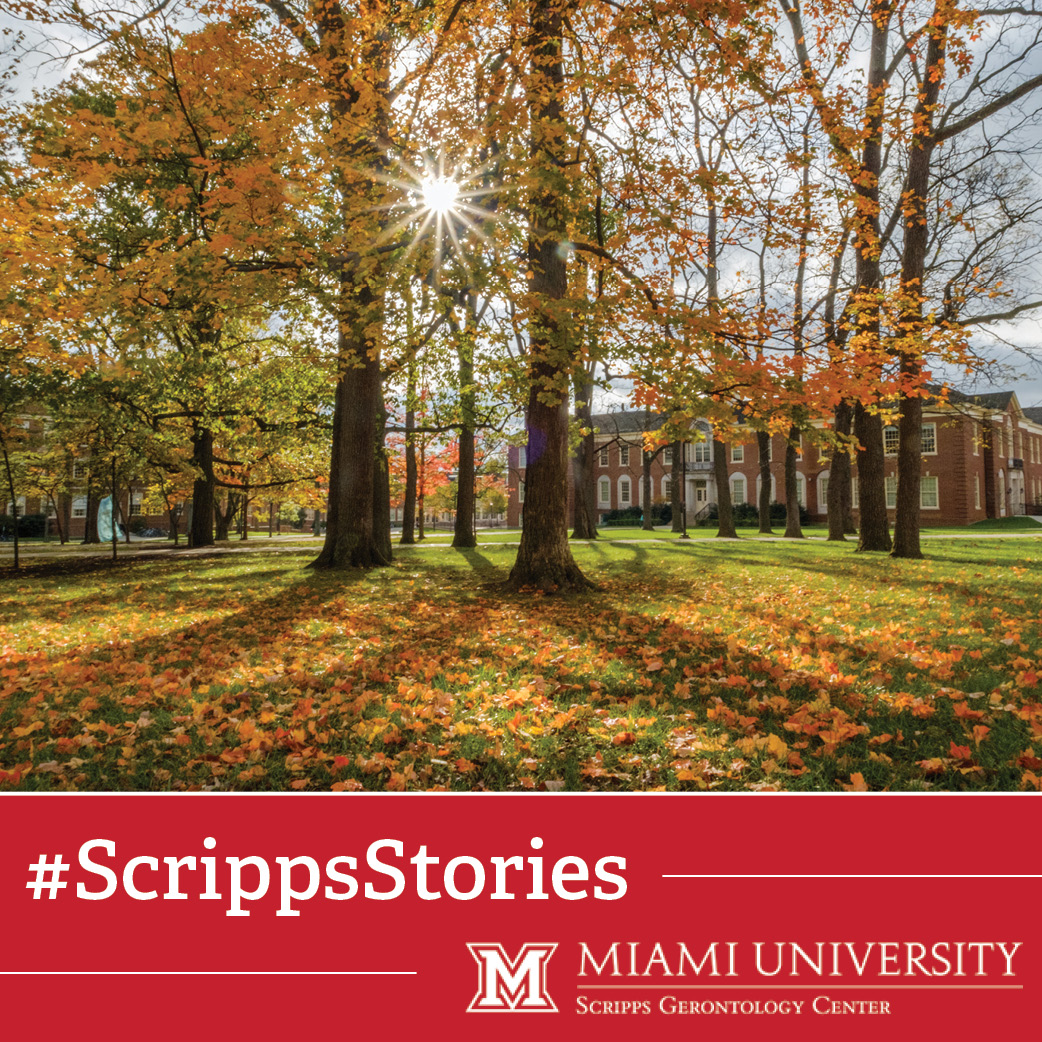
Scripps Gerontology Center took the month of November to acknowledge how thankful we are for the people who have been involved with Scripps over the years. For three weeks, we featured personal stories from our faculty, staff, students, and alumni on our Facebook and Instagram pages. These stories showed the diversity in how many of us found a passion for gerontology and how it intertwines with our personal lives.
The social media campaign on Facebook gathered 9,560 impressions and 1,501 engagements, with a reach of 8,307 people. Page views increased 77% compared to the previous month.
On Instagram, the posts collected 944 impressions, 114 likes, and reached 768 people. Compared to the previous month on Instagram, profile visits increased over 241%.
Read on to see all 12 stories featured.
 “I love solving problems—and there is never a day without a problem! So, I welcome them. I think those are our opportunities to innovate. For example, the fitness center and the pool in one of our retirement communities closed at five o’clock when the staff left. I started asking the question, “Why are we closing these? What if a resident wants to swim at eight o’clock at night? If you lived in an independent apartment building, the pool would be open.” The “why” turned out to be the risk and what would happen if the resident fell and no one was around to help them.
“I love solving problems—and there is never a day without a problem! So, I welcome them. I think those are our opportunities to innovate. For example, the fitness center and the pool in one of our retirement communities closed at five o’clock when the staff left. I started asking the question, “Why are we closing these? What if a resident wants to swim at eight o’clock at night? If you lived in an independent apartment building, the pool would be open.” The “why” turned out to be the risk and what would happen if the resident fell and no one was around to help them.
So, we had to problem solve, and think about providing a resident-centered experience rather than staff-driven. The pool has been open 24 hours a day, seven days a week (for more than a year now), with two evenings a week designated as family night. Now you see children and grandchildren interacting with their parents and grandparents in a different way.
We really have to be mindful not to put parameters on people as they age. We tend to become parental rather than empowering our residents to age as they want.”
-Julie Kaminski, MGS (‘00), Senior Vice President & Chief Operations Officer, Immanuel, 2019 Cottrell Distinguished Alumni Awardee
 “My father and grandfather were both diagnosed with forms of cognitive impairment. My grandfather lived with Alzheimer’s disease in his later years and my father is currently living with dementia.
“My father and grandfather were both diagnosed with forms of cognitive impairment. My grandfather lived with Alzheimer’s disease in his later years and my father is currently living with dementia.
The pandemic has presented a significant challenge in navigating visitation while my father is in a nursing home. My mother was able to see him in late July, for the first time in months, but positive cases have been confirmed in a staff member and a resident. Thus, visitation has once again been prohibited at his facility. I wish I could interact with my father in person, like before, but we have adapted by calling him, writing to him, and visiting from outside of his window. The experiences that my family members have had drive me to make the experience of dementia easier for those involved and is my inspiration for studying gerontology.”
-Alex D’Errico-Bronston, current MGS student
 “I started out as a social worker with the “Golden Age Club” at a community center. One time, I spent a day convincing a first-time visitor to come to the senior center and be engaged. My first reaction was to pat myself on the back. But then I began to think, “is she really better off? Was this the right thing to do?” My self-doubt about how better to help older people sparked my career as a researcher.
“I started out as a social worker with the “Golden Age Club” at a community center. One time, I spent a day convincing a first-time visitor to come to the senior center and be engaged. My first reaction was to pat myself on the back. But then I began to think, “is she really better off? Was this the right thing to do?” My self-doubt about how better to help older people sparked my career as a researcher.
As a doctoral student, I then got to work on an evaluation project looking at whether home and community-based services could reduce nursing home use for older people. And I have been working on this issue for the past four decades. I feel lucky to combine my social work background with my applied research perspective. I am committed to ensuring that any research I do can have a lasting impact on those in practice, policy makers, and older persons themselves.”
-Robert Applebaum, PhD, Director of the Ohio Long-Term Care Research Project, Scripps Gerontology Center
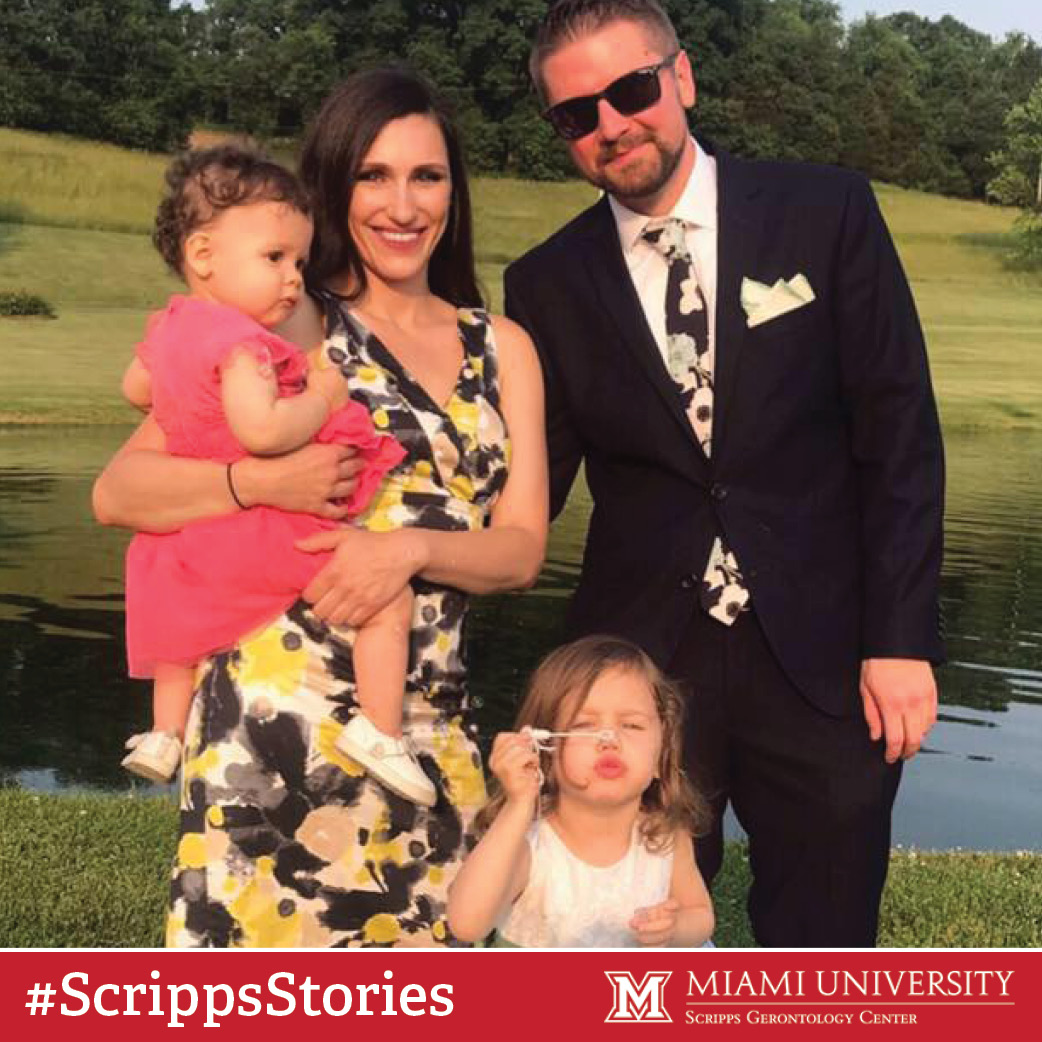 “While an undergraduate, I realized that I was deeply interested in family dynamics—the contexts, characteristics, roles, and interactions within the family unit. As I continued to learn and grow, I realized I was very interested in these aspects across the lifespan with a specific focus on family caregiving to older adults and to children with medical needs.
“While an undergraduate, I realized that I was deeply interested in family dynamics—the contexts, characteristics, roles, and interactions within the family unit. As I continued to learn and grow, I realized I was very interested in these aspects across the lifespan with a specific focus on family caregiving to older adults and to children with medical needs.
Fast forward six years, and I now have two kids of my own. I knew when my first daughter was born that I wanted to provide her with the best life I was capable of, and I needed a higher education to do that. So, I went back to graduate school and am now pursuing my PhD in Social Gerontology with Scripps.
Kids are great at mimicking the world they see. My girls like to sit on my laptop and play around with the mouse and keyboard. I remember in one class, we were asked to refer back to an article that we had read. To my surprise, my girls had taken the PDF highlighter and had drawn all over this article! I couldn’t help but laugh at that moment. Being a mother while pursuing an education can be challenging but also so rewarding and full of surprising moments.
Having children who are counting on me is my greatest motivation in my education.”
-Athena Koumoutzis, current PhD student
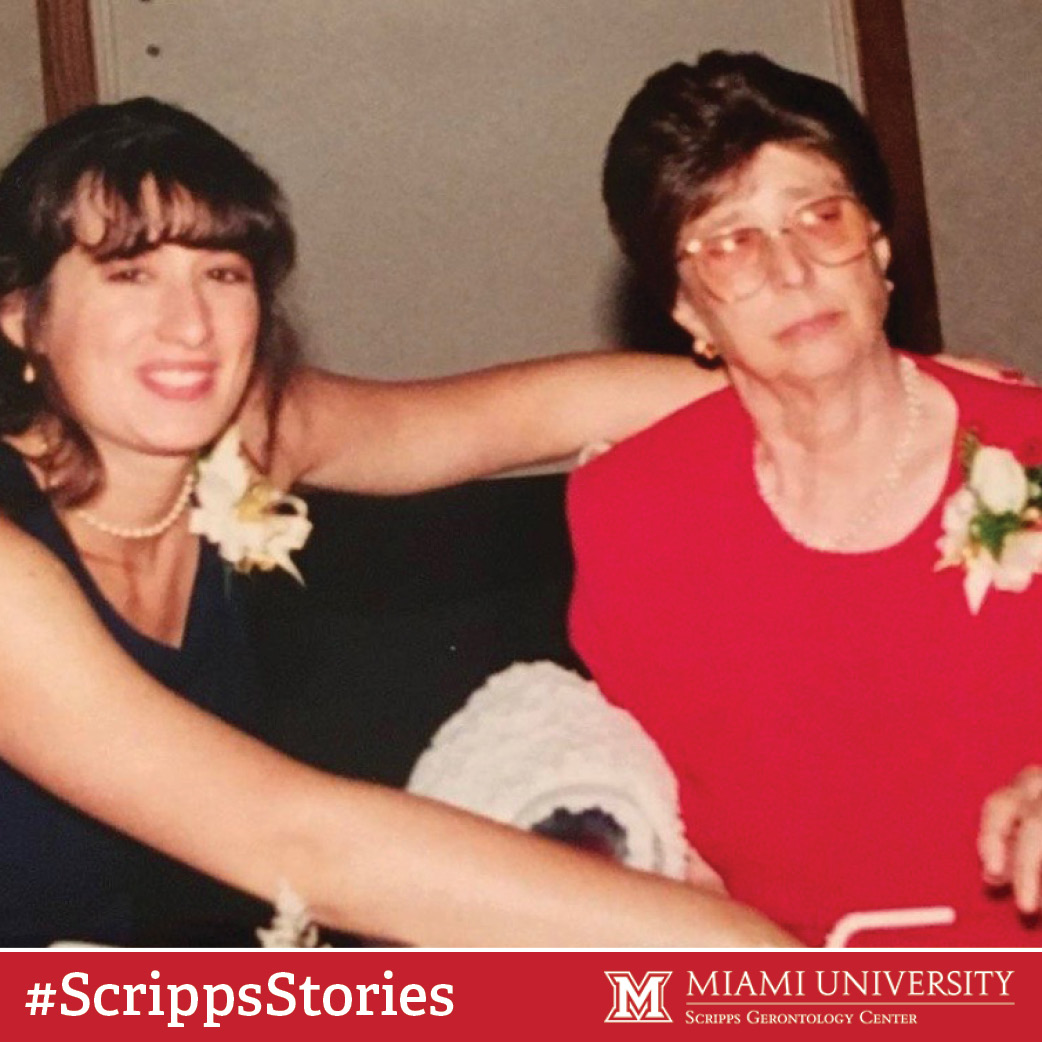 “Throughout high school and college, I worked as a nurse aide. In my senior year of college, my grandmother, who lived with dementia, moved into the nursing home where I worked. It was very eye-opening to be both an employee and a family member. As long as I could remember, my grandmother had always worn a wig; she even wore one when she slept. It was an important part of her identity. After she moved in to the home, it was a constant struggle to make sure that she always had her wig on. I would often come into her room and find her without it and it was very distressing to her. I wrote notes for the staff, but it continued to happen. As an aide, I understood how busy the staff were and how many people they were trying to care for. But as a family member, I saw firsthand how demoralizing it is when staff don’t honor the preferences and small details that make people who they are. This experience with my grandmother is what drives my passion for person-centered care. As a Scripps Research Scholar, I continue to study how we can improve the lives of older adults and their families by creating person-centered environments, services, and systems.”
“Throughout high school and college, I worked as a nurse aide. In my senior year of college, my grandmother, who lived with dementia, moved into the nursing home where I worked. It was very eye-opening to be both an employee and a family member. As long as I could remember, my grandmother had always worn a wig; she even wore one when she slept. It was an important part of her identity. After she moved in to the home, it was a constant struggle to make sure that she always had her wig on. I would often come into her room and find her without it and it was very distressing to her. I wrote notes for the staff, but it continued to happen. As an aide, I understood how busy the staff were and how many people they were trying to care for. But as a family member, I saw firsthand how demoralizing it is when staff don’t honor the preferences and small details that make people who they are. This experience with my grandmother is what drives my passion for person-centered care. As a Scripps Research Scholar, I continue to study how we can improve the lives of older adults and their families by creating person-centered environments, services, and systems.”
-Jennifer Heston-Mullins, PhD (‘17), LISW, Research Scholar, Scripps Gerontology Center
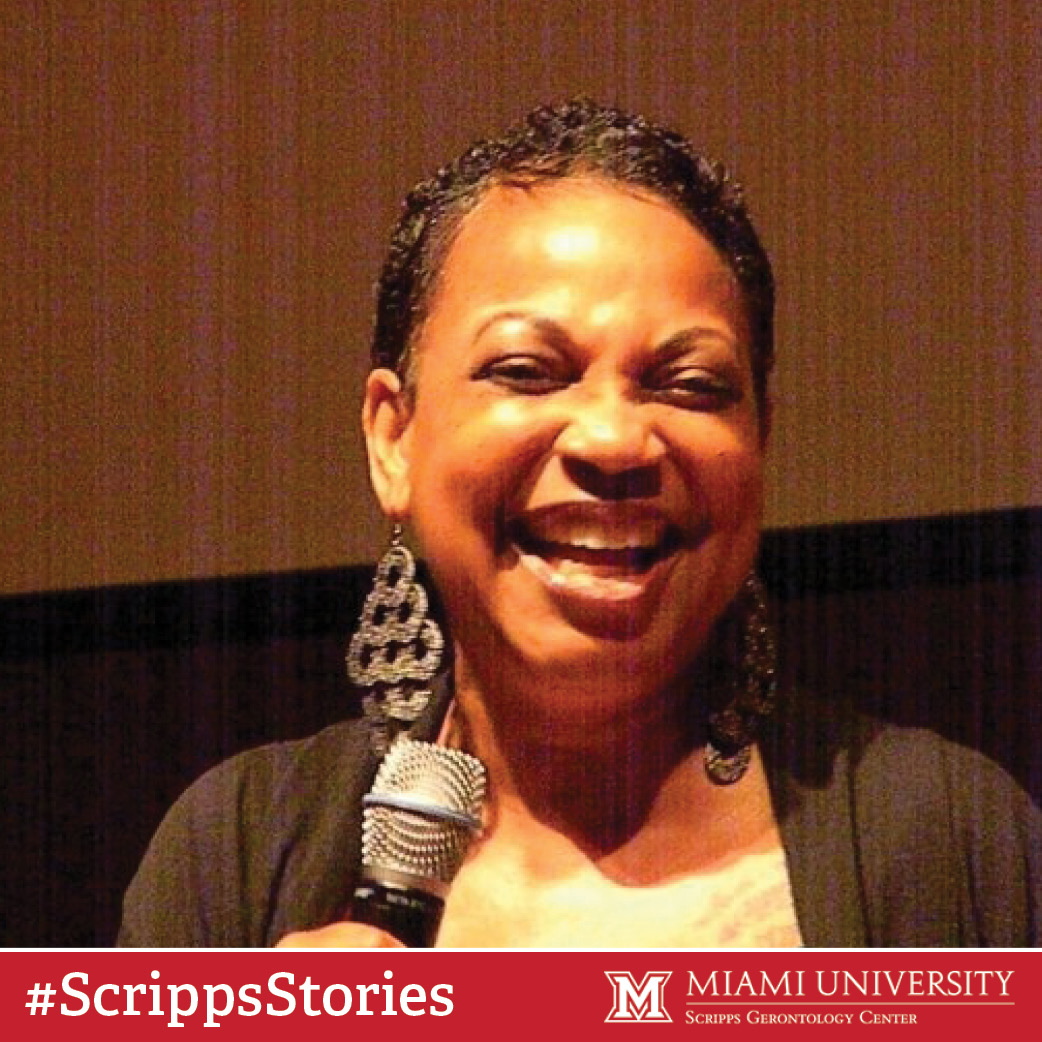 “For the past 37 years I have worked as a standup comedian. As a professional comic, my life was very different prior to COVID-19 and graduate school. The last gig I had was in late February. I think one of the toughest adjustments is my shift in lifestyle. It’s like going from living the life of a rock star—staying up late, constantly being on a plane, and traveling around the world—to the life of a student. I went to The Bronx High School of Science in New York City in the sixties. At the reunions there are only two people who are not doctors: me and a rock star.
“For the past 37 years I have worked as a standup comedian. As a professional comic, my life was very different prior to COVID-19 and graduate school. The last gig I had was in late February. I think one of the toughest adjustments is my shift in lifestyle. It’s like going from living the life of a rock star—staying up late, constantly being on a plane, and traveling around the world—to the life of a student. I went to The Bronx High School of Science in New York City in the sixties. At the reunions there are only two people who are not doctors: me and a rock star.
There is an upside to the halt of my comedy gigs and shift in lifestyle. It allowed me the opportunity to slow down enough to go back to school. I have been wanting to for a while, both for personal growth and to impact my business (HaHA Institute~International Institute of Humor and Healing Arts). Normally, during this time of year, I am performing at resorts, festivals, and on cruise circuits. I can’t ignore my position as a non-traditional student. Although it can be difficult, I think it provides me with a unique way of approaching gerontology, and I am excited to operate in a relatively unexplored space.”
-Sati Williams, current PhD student
 “Let me tell you about my best friend(s)”. Sharon and Carol are two women I have been able to count on for most of my life. When I was a baby they watched me in Sunday school, in Junior high they were my mentors, and now as an adult they are two of my closest friends. They also happen to be in their 70s. Self identifying as the Crazy Art Ladies when we are not in a pandemic, we go on art centered trips, exploring new places and growing in each other’s company.
“Let me tell you about my best friend(s)”. Sharon and Carol are two women I have been able to count on for most of my life. When I was a baby they watched me in Sunday school, in Junior high they were my mentors, and now as an adult they are two of my closest friends. They also happen to be in their 70s. Self identifying as the Crazy Art Ladies when we are not in a pandemic, we go on art centered trips, exploring new places and growing in each other’s company.
There are many things they have impacted in my life including my tattoos. Carol had the magnificent idea that we should all get a matching tattoo. So we did. When I was deciding what to study in college Sharon and Carol were my biggest influences. Studying gerontology has ignited a passion in me and it has equipped me to be a better and more understanding friend.”
-Hannah McCarren, current MGS student
 “When I started studying sports management at the Ball State University (BSU) in 2004, I didn’t know what gerontology was. During my first year in the U.S., I had a hard time paying tuition fees and living expenses (I didn’t know things were that expensive in the U.S.). Since my admission was conditional on taking all ESL (English as a second language) courses, I was taking five English courses between 8 a.m. and 5 p.m., and taking one graduate-level course between 6:30 p.m. and 9 p.m. twice a week.
“When I started studying sports management at the Ball State University (BSU) in 2004, I didn’t know what gerontology was. During my first year in the U.S., I had a hard time paying tuition fees and living expenses (I didn’t know things were that expensive in the U.S.). Since my admission was conditional on taking all ESL (English as a second language) courses, I was taking five English courses between 8 a.m. and 5 p.m., and taking one graduate-level course between 6:30 p.m. and 9 p.m. twice a week.
One day, my friend told me there was an opening for the graduate assistantship at the Fisher Institute for Wellness and Gerontology (BSU). At that time, I didn’t think too much and just applied for it; I never thought I would get it. But somehow, the Fisher Institute offered me a position. Later, I found that one of the faculty members, Dr. Kathy Segrist liked my application and recommended me. I didn’t know her at that time but later she became my academic advisor and mentor who showed me a way to get a Ph.D. in social gerontology at Miami University.
There was one condition that came with the graduate assistantship—you needed to be a student in their applied gerontology master’s program. They asked me if I was interested in this assistantship, which comes with a tuition waiver and stipends, and enrolling in the applied gerontology master’s program. I didn’t even know what gerontology was but I said yes.
A long story short, after taking Dr. Siegrist’s introductory gerontology course, being involved in aging-related research projects and working at the local senior center as a graduate assistant, I became interested in the study of aging. Then, I realized that my home country is known as a super-aging society, and Japan needs more gerontology research and education. I thought that I could make a difference, so I decided to pursue a Ph.D. program in social gerontology at Miami University in 2007.”
-Takashi Yamashita, PhD ('11), Associate Professor of Sociology and Innovation Fellow at University of Maryland, Baltimore County, 2020 Cottrell Distinguished Alumni Awardee
 “I began my career in gerontology during my master’s in medical humanities. At this point, I was thinking about leaving the program when my mentor, Dr. Tom Cole, asked if I would be interested in using what I learned as an undergraduate English major to create an autobiographical writing workshop for older persons.
“I began my career in gerontology during my master’s in medical humanities. At this point, I was thinking about leaving the program when my mentor, Dr. Tom Cole, asked if I would be interested in using what I learned as an undergraduate English major to create an autobiographical writing workshop for older persons.
At first I thought that would be horrible. What would older persons' stories be like? Sad? Boring? However, from the moment the first group met, I knew I wanted to change my focus to gerontology, which I did. My subsequent focus on narratives and individual experiences shaped by culture have provided me with me a unique perspective focused on on the big questions that apply to old age and life in general: what is meaningful in a life; what makes life worth living; how does culture, including the stories we tell, influence how we understand aging; how do we move beyond what is measurable to the bigger question of what makes us human? If we are lucky enough, we all will grow old. I want to make sure that "grow" stays in the forefront.”
-Kate de Medeiros, PhD, Professor, Department of Sociology & Gerontology and Scripps Research Fellow
 “I became a gerontologist when I turned 50 because I feared aging. I focused on dementia because I feared losing my memories, my mind, and my identity. These fears, rooted in ageist views of growing old, are very common.
“I became a gerontologist when I turned 50 because I feared aging. I focused on dementia because I feared losing my memories, my mind, and my identity. These fears, rooted in ageist views of growing old, are very common.
Of all forms of discrimination, ageism is the most understated, and, yet, it affects ALL of us. The stigma is even worse for people living with dementia, who are viewed as dependent care recipients that we only need to keep safe, clean, and comfortable as they wait to die. This violates their human rights.
Meanwhile, the job-oriented credentialing process embraced by our educational systems crowds out our students’ needs, interest, and capacity to grow through intergenerational interactions. This undermines their right to meaningful education.
Connecting the two generations is what motivated me to become a gerontologist and develop the Opening Minds through Art (OMA) program in 2007. I was able to integrate my three areas of studies: fine arts, education, and gerontology. These may seem like unrelated fields, but I was able to integrate them in developing OMA, which is an intergenerational art program for people living with dementia.”
To learn more about OMA, visit their website at ScrippsOMA.org.
-Elizabeth “Like” Lokon, PhD, MGS (‘08), Director of Opening Minds through Art
 "Pursuing education has always been supported by my family. Both of my parents instilled in me a conviction for learning and development, both professionally and personally. Two years after my father’s death, during my first semester in the PhD program, I unexpectedly lost my brother. While in the throes of grief and healing, I began to question and contemplate things that I hadn’t previously considered. I found myself regularly asking “what have I been putting off that I’ve always wanted to do?” This reflective question spurred me to reevaluate my life’s priorities and values – after all, we only get one chance at this thing called “life”. As odd as it may sound, I believe moving through my grief (rather than around it) helped open doors that had long been closed.
"Pursuing education has always been supported by my family. Both of my parents instilled in me a conviction for learning and development, both professionally and personally. Two years after my father’s death, during my first semester in the PhD program, I unexpectedly lost my brother. While in the throes of grief and healing, I began to question and contemplate things that I hadn’t previously considered. I found myself regularly asking “what have I been putting off that I’ve always wanted to do?” This reflective question spurred me to reevaluate my life’s priorities and values – after all, we only get one chance at this thing called “life”. As odd as it may sound, I believe moving through my grief (rather than around it) helped open doors that had long been closed.
Suddenly, by looking through new lenses, there were new opportunities everywhere. I discovered a renewed belief in myself: that I can survive difficult moments, I can trust my insights, and I can feel empowered in my decisions. I believe this personal development has helped me successfully navigate a rigorous doctoral program, which will be particularly helpful in the coming months as I enter an uncertain job market rattled by the pandemic."
-Leah Janssen, MGS ('07), current PhD student
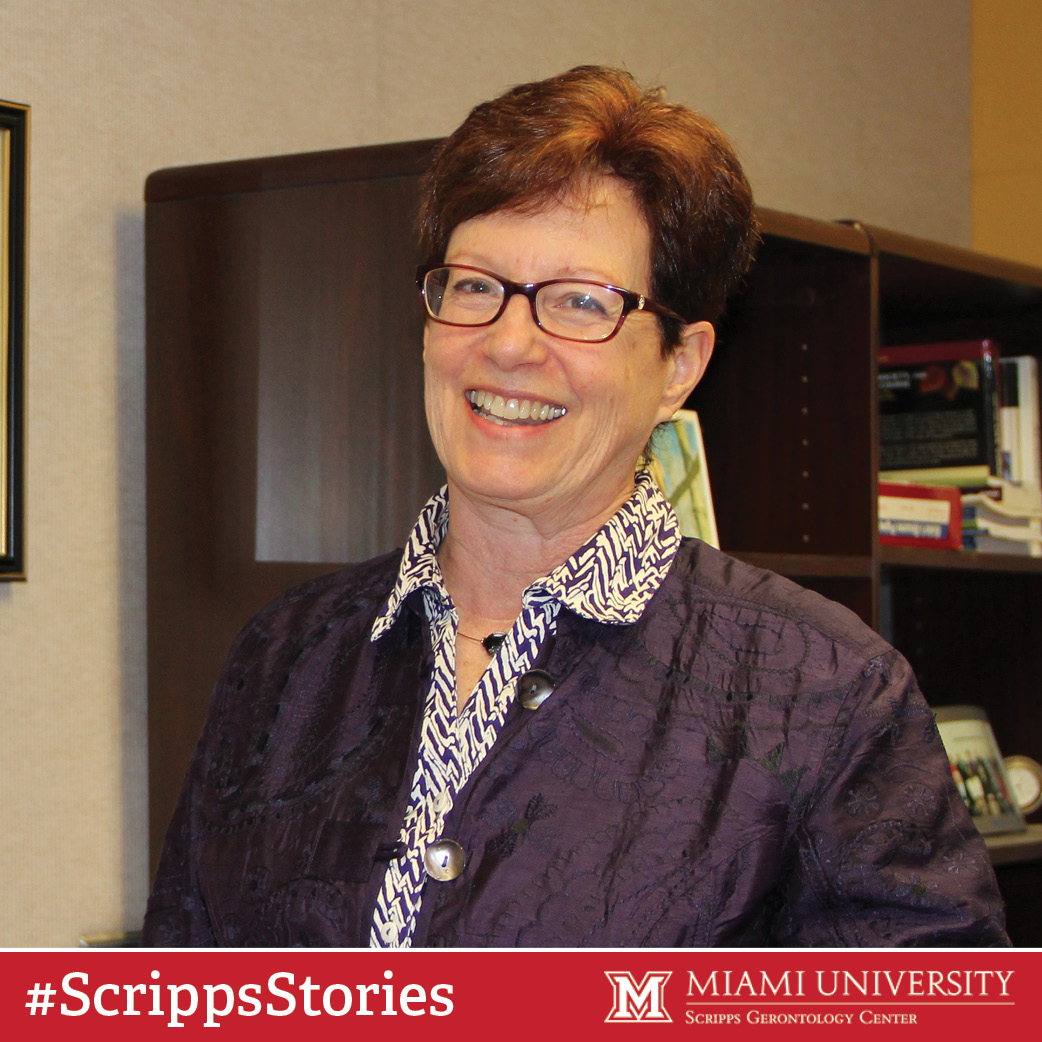 “’Human development doesn’t stop at early adulthood. Some psychologists are starting to look at personal growth and developmental changes that occur all the way through old age.’ While this is hardly a ground-breaking observation today, it was an eye-opening idea offered to me in 1974 by my undergraduate advisor who was helping me think about what kind of graduate programs I should consider.
“’Human development doesn’t stop at early adulthood. Some psychologists are starting to look at personal growth and developmental changes that occur all the way through old age.’ While this is hardly a ground-breaking observation today, it was an eye-opening idea offered to me in 1974 by my undergraduate advisor who was helping me think about what kind of graduate programs I should consider.
